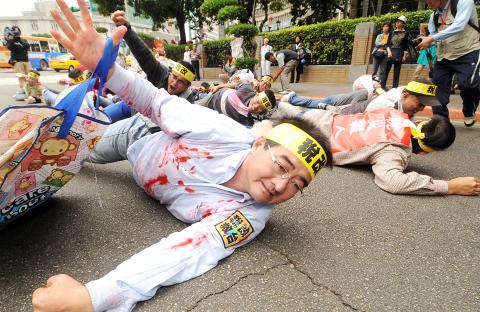An initiative to refer the controversial Economic Cooperation Framework Agreement (ECFA) to a plebiscite has received enough signatures for submission to the Referendum Review Committee once again, organizers said.
Following two failed attempts earlier this year, the Taiwan Solidarity Union (TSU) announced yesterday it had gathered another 100,000 petition signatures, more than the number needed to be considered for placement on a future ballot.
“This initiative is reflective of the level of determination Taiwanese have to repeal the ECFA,” TSU Chairman Huang Kun-huei (黃昆輝) said, leading party members in submitting the boxes of signatures to the Central Election Commission.

PHOTO: GEORGE TSORNG, TAIPEI TIMES
“Although the ECFA has already come into force, we still want to remind the public that the agreement’s negative effects will soon become increasingly apparent,” he said. “Very soon, everybody will be feeling the impact.”
The measure, which must be approved by the Central Election Commission and the referendum committee before it can proceed to the second stage of the referendum process, will put the entire agreement to a legally binding public vote.
The committee, which is responsible for screening referendum measures, earlier this year rejected two related proposals that were spearheaded by the TSU, citing a contradiction between the referendum question and content of the proposal. An earlier proposal raised by the DPP was also rejected last year.
The TSU claims that efforts to block the referendums were “unfair and undemocratic,” citing the Referendum Act (公投法), a position the government has dismissed.
Critics have said that the poll is necessary because the ECFA, which reduces cross-strait tariffs for select goods and services, will result in a harmful influx of cheaper Chinese goods. This could depress middle-class salaries and cost jobs, they said, especially among more traditional industries.
In April, a poll by the Liberty Times (the Taipei Times’ sister newspaper) found that 36 percent of Taiwanese surveyed said they opposed the agreement compared with 28 who supported it.

Several Chinese Nationalist Party (KMT) officials including Chairman Eric Chu (朱立倫) are to be summoned for questioning and then transferred to prosecutors for holding an illegal assembly in Taipei last night, the Taipei Police said today. Chu and two others hosted an illegal assembly and are to be requested to explain their actions, the Taipei City Police Department's Zhongzheng (中正) First Precinct said, referring to a protest held after Huang Lu Chin-ju (黃呂錦茹), KMT Taipei's chapter director, and several other KMT staffers were questioned for alleged signature forgery in recall petitions against Democratic Progressive Party (DPP) legislators. Taipei prosecutors had filed

Taiwan would welcome the return of Honduras as a diplomatic ally if its next president decides to make such a move, Minister of Foreign Affairs Lin Chia-lung (林佳龍) said yesterday. “Of course, we would welcome Honduras if they want to restore diplomatic ties with Taiwan after their elections,” Lin said at a meeting of the legislature’s Foreign Affairs and National Defense Committee, when asked to comment on statements made by two of the three Honduran presidential candidates during the presidential campaign in the Central American country. Taiwan is paying close attention to the region as a whole in the wake of a

NEW WORLD: Taiwan is pursuing innovative approaches to international relations through economics, trade and values-based diplomacy, the foreign minister said Taiwan would implement a “three-chain strategy” that promotes democratic values in response to US tariffs, Minister of Foreign Affairs Lin Chia-lung (林佳龍) said. Taiwan would aim to create a “global democratic value chain,” seek to capitalize on its position within the first island chain and promote a “non-red supply chain,” Lin was quoted as saying in the ministry’s written report to the Legislative Yuan submitted ahead of the legislature’s Foreign Affairs and National Defense Committee meeting slated for today. The Ministry would also uphold a spirit of mutual beneficial collaboration, maintaining close communication and consultations with Washington to show that Taiwan-US cooperation

Taiwan and the US have begun trade negotiations over tariffs imposed by US President Donald Trump earlier this month, Minister of Foreign Affairs Lin Chia-lung (林佳龍) said in an interview this morning before reporting to the Legislative Yuan’s Foreign Affairs and National Defense Committee. The Taipei Economic and Cultural Representative Office (TECRO), Taiwan’s de facto embassy in the US, has already established communication channels with the US Department of State and the US Trade Representative (USTR), and is engaging in intensive consultations, he said. Points of negotiation include tariffs, non-tariff trade barriers and issues related to investment, procurement and export controls, he